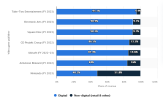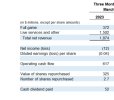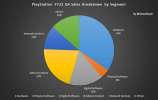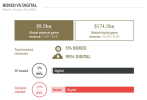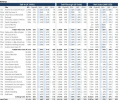I have no idea who "Christopher Dring" is. Is there any reason I should? If there's pertinent information about who a person is that informs the conversation, it's useful to add it!
Your entire argument as "here's a tweet from a personality" and no actual explanation of your point, followed by dissing other people's points without extending your point to make it clearer. You assumed the knowledge you had of the information was shared and people not responding in the same way were illogical, rather than uninformed. And be generally condescending to those who prefer digital.
Furthermore, there's a conversation about that tweet asking what the numbers even are. Apparently Dring is citing a poll, not market research. There's also a different gaming culture in Japan with more physicality, I dare say, which is where data needs be brought in from other regions.
It's not as black-and-white as you interpreted and the conversation hasn't gone as well as it could have if tackled differently...
Find better data supporting your argument than an unexplained tweet from an unexplained personality about an unclear source! You can extend your argument in the pro-physical direction with the physical sales of Sony's first party titles. Here's a table of sales with digital breakdown.
View attachment 11553
Players prefer to buy the big-ticket items on disc, up to
80%! I think this is from the Insomniac leak. But then there's quite some discussion on just that, with some games selling far more digitally...
Regardless, I'll still say we'll end up all digital. One of the main reasons people like physical is because it's cheaper, but there's no reason for digital to be more expensive (indeed, quite the converse). The companies just like holding the price higher. However, physical isn't so much cheaper, but cheaper
earlier, at least until you get into second hand. Digital copies are still discounted over time to drive sales. A $70 disk game will be $50 and then $30, but so will the digital version, just a lot later. What we don't see is digital prices plummet over two months as can happen with physical, which is good pricing for the consumer but poor business for the producers and something they want to avoid. When the console companies finally want people to swap to digital and the consumers aren't eager, they only need make digital $10 cheaper than store bought and a lot will swap over. That in turn will dry up the physical supply into the second hand market eliminating that physical price drop.
And on the point of 'archiving', if people want to buy physical to keep their game forever, there is no second hand market. There's only a second hand market if people want to play and then sell on, which is all about price sensitivity. Those two positive aspects of physical games are actually mutually exclusive which means if either-or is a dominant reason to buy physical, it'll undermine the other; they can only coexist in balance due to different people having different values.
Honestly, there's lots that can be said if we want to discuss this rather than just assert a perspective and talk down to those who think differently.
I'm sorry but it becomes frustrating when conversations bases that are pretty well founded get shut down for reasons that I struggle to understand.
Christopher Dring publishes and has access to sales data for Europe for the GSD.
Games Sales Data is the first video games chart providing sales data in both retail and digital markets. It publishes weekly reports of physical and digital sales over 50 EMEA and APAC territories.
The Digital data incorporates games from Activision Blizzard, Bandai Namco, Capcom, Codemasters, Dontnod Entertainment, EA, Focus Entertainment, Koch Media, Konami, Microsoft, Milestone, Paradox Interactive, Sega, Sony, Square Enix, Take-Two, Tiny Bull, Ubisoft, Ustwo and Warner Bros.
The Physical data comprises games from every publisher sold in Austria, Belgium, Denmark, Finland, France, Germany, Italy, Netherlands, Norway, Poland, Portugal, Russia, Spain, Sweden and Switzerland. Retail charts are being displayed in both volume and value.
Territories covered by the scope of digital data charts includes Australia, Austria, Bahrain, Belgium, Bulgaria, Croatia, Cyprus, Czech Republic, Denmark, Finland, France, Germany, Great Britain, Greece, Hungary, Iceland, India, Ireland, Israel, Italy, Kuwait Lebanon, Luxembourg, Malta, Netherlands, New Zealand, Norway, Oman, Poland, Portugal, Qatar, Romania, Russia, Saudi Arabia, Slovakia, Slovenia, South Africa, Spain, Sweden, Switzerland, Turkey, Ukraine and UAE.
As far as the insomniac data goes, I have mentioned it already multiple times. It's one of the strongest supporting arguments that consumer habits aren't changing that drastically, with the COVID period being the lowest "crisis" for obvious reasons, and the low percentages that it's losing in some markets is due to the presence of digital only consoles.
On "preservation", I don't really have a good opinion on it. If the game files gets shared on the internet by enough people I think it should be safe, and physical deteriorates over time, so that's not an argument in favor of physical as far as I can see. True preservation will always be on PC.
But maybe I'm wrong.


